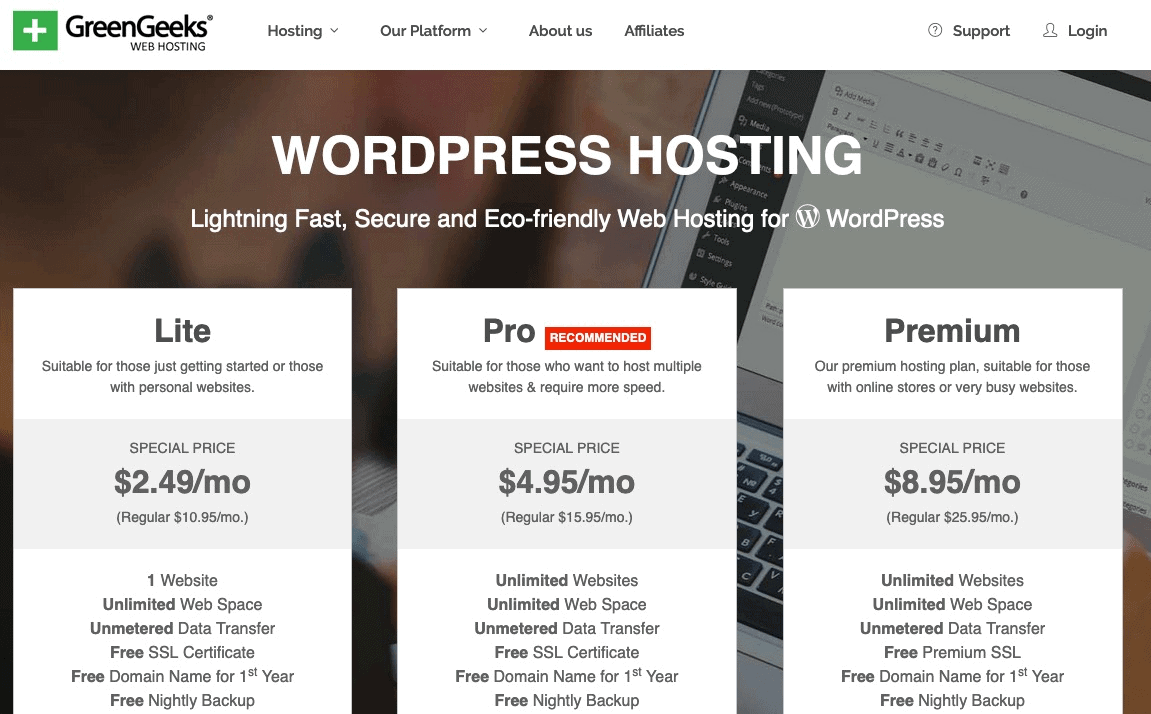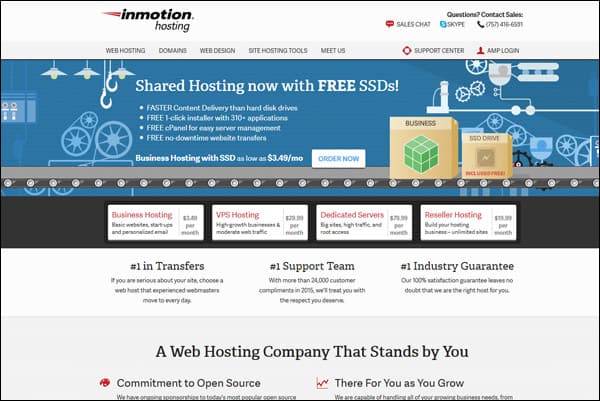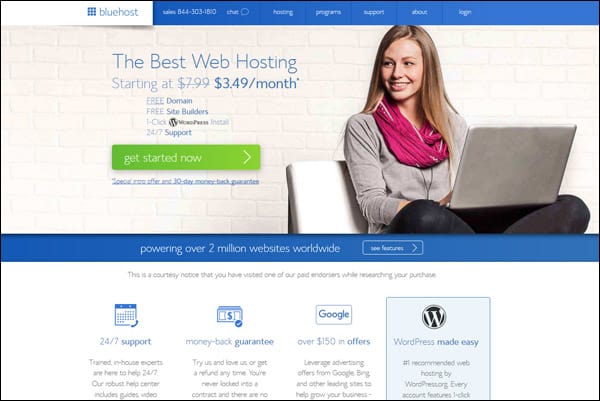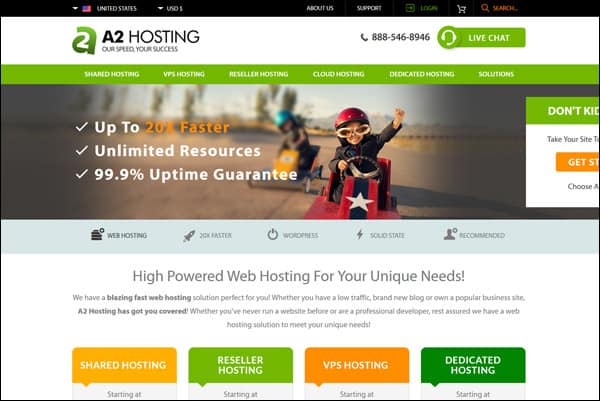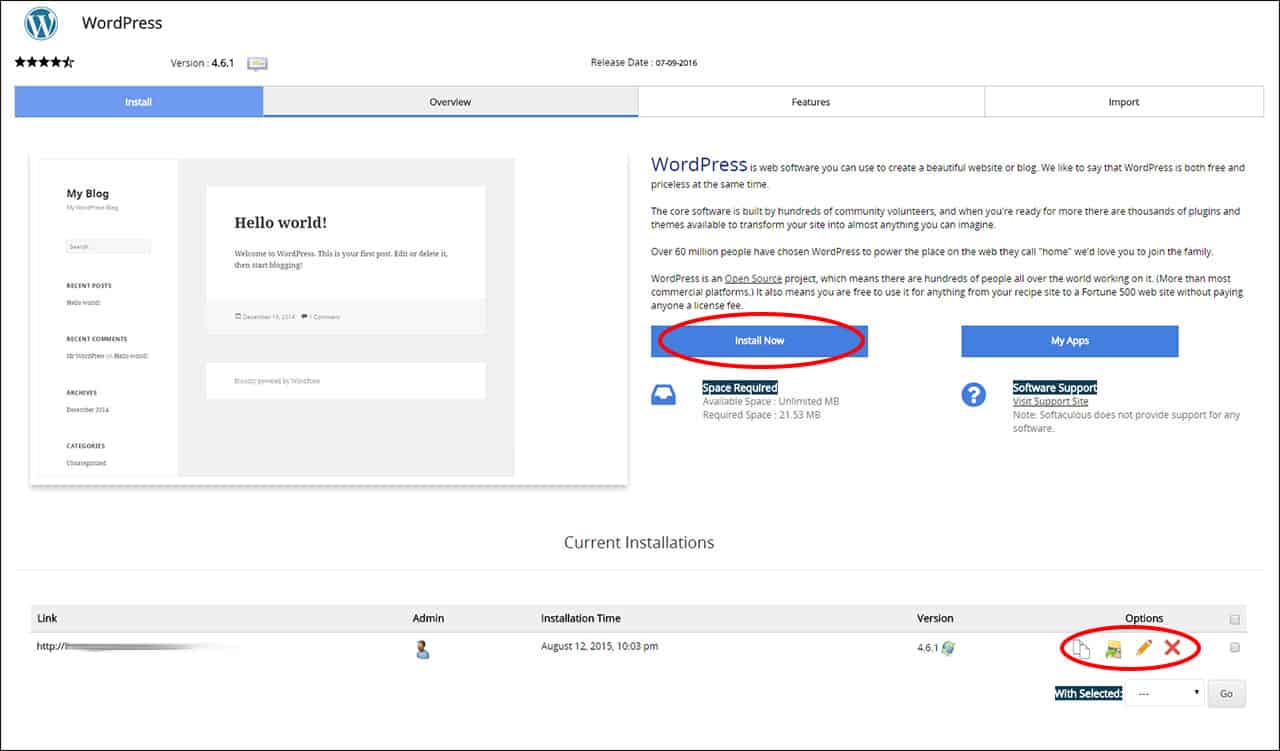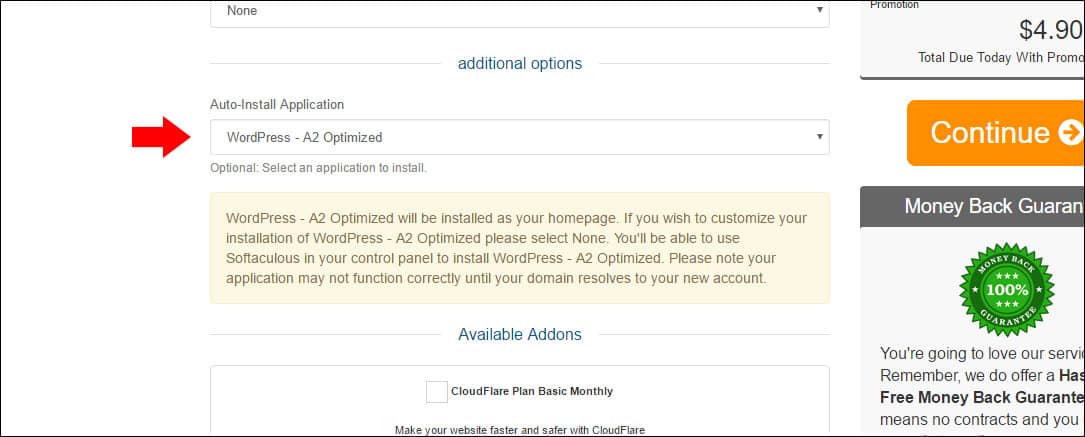Tooltester is supported by readers like yourself. We may earn an affiliate commission when you purchase through our links, which enables us to offer our research for free.
WordPress is one of the most popular content management systems for building a website. Did you know that over 43% of all sites on the internet are built with it?
WordPress is awesome and we love it! But one of the issues we all face with WordPress is finding a fast & reliable web host.
WordPress is a bit resource intensive and requires a high performance web host along with a bit of onsite optimization to get it running at peak speeds.
In this article, we’ll discuss the best WordPress web hosting services that come highly recommended not only by us, but in the WordPress community as well.
The Best WordPress Web Hosts at a Glance
Here’s a quick overview of the top choices for WordPress web hosting. We’ve listed the different purposes we would recommend each one for:
| Web Host | Starts at: | Recommended for: | Learn more |
|---|---|---|---|
| GreenGeeks | $4.95/mo | High-performance and green hosting for WordPress | View Plans |
| InMotion Hosting | $4.99/mo | Affordable, high-performance WordPress hosting with NGINX | View Plans |
| HostGator | $4.95/mo | Small business cloud-based WP hosting for uptime & reliability | View Plans |
| WP Engine | $28.00/mo | Enterprise WordPress hosting for serious performance & reliability | View Plans |
| Bluehost | $19.99/mo | Optimized VPS hosting for larger WordPress sites | View Plans |
| A2 Hosting | $12.97/mo | Fast, optimized & managed WordPress web hosting | View Plans |
Note: Please be aware that the prices referenced in this article are before renewal, bear in mind that these can increase after.
GreenGeeks
High-performance & green energy
Starts at: $4.95/mo
We are big fans of the simple and powerful GreenGeek‘s approach. Its shared hosting makes it easy for you to install WordPress and manage your installation.
Of course, the fact that it’s a green-powered host can be very attractive for some, which doesn’t impact on the fact that it’s a reliable and powerful host. Check out its performance for more information.
Read our full GreenGeeks review.
Key Features:
- WordPress 1-click installs
- Unlimited traffic
- Auto WordPress updates
- Unlimited storage
- Several server locations
- Good customer care
- Supports PHP 7
InMotion Hosting
Affordable, Reliable, & High Performance Hosting for WordPress
Starts at: $4.99/mo
www.inmotionhosting.com is one of our favorite choices for web hosting and is well-suited for WordPress websites.
They recently launched new (and incredibly affordable) managed WordPress hosting plans. Although technically these plans are a type of shared web hosting, they are fully managed and optimized for WordPress.
Plans come with NGINX, SSDs, include cPanel, a 1 click WordPress install via Softaculous, and free backup and restore. We highly recommend InMotion Hosting for both large and small businesses that use WordPress websites.
Read our full InMotion review.
Key Features:
- WordPress 1-click installs
- Managed, with NGINX
- Auto WordPress updates
- Free backups & restores
- High performance & uptime
- WP-CLI integration
- A+ Customer Support
- Supports PHP 7
HostGator
Cloud Based WordPress Hosting for Uptime & Reliability
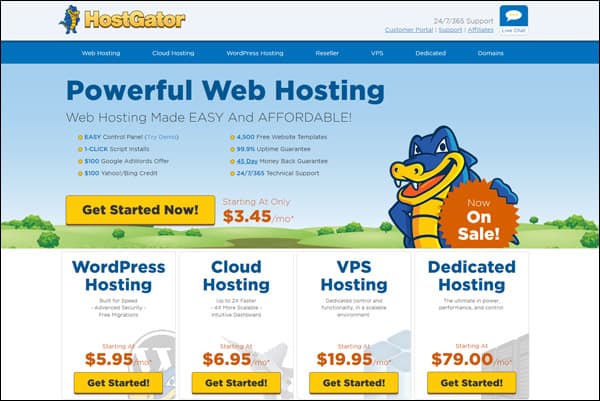
45 Day Money-Back Guarantee
Starts at: $4.95/mo
www.hostgator.com is a well-known web host and another great choice to host your WordPress website. They have shared, vps, cloud, and dedicated plans to fit your specific needs.
For starting off with WordPress, you can use their standard shared web hosting (which starts at $2.78 per month). It’s the most common and affordable solution.
However, we would highly recommend a step up to their hybrid cloud web hosting (starting at $4.95 per month), which offers improved performance at a minimal cost difference.
It’s a bit confusing as they also have a managed WordPress cloud hosting plan series (which you can find on their website), which is different & not as good as the hybrid cloud plans we’re promoting here.
The reason for this is that the managed WordPress cloud plans do not have cPanel or phpMyAdmin (no way to edit your database), which can be very limiting for advanced users.
The main plans we’ve listed here includes cPanel and access to edit your MySQL database through phpMyAdmin.
All plans come with the HostGator WalkMe and Mojo Marketplace plugins (which some might view as bloatware), but can be removed.
All in all, HostGator offers exceptional performance and reliability for WordPress sites. Read our full HostGator review.
Key Features:
- Variety of plans
- Great for all WP sites
- Cloud based hosting
- WordPress 1 click install
- Solid performance & uptime
- A+ customer support
- Supports PHP 7
- cPanel control panel
- Custom cloud interface
WP Engine
Expert WordPress Hosting with A+ Speeds & Customer Care

60 Day Money-Back Guarantee
Starts at: $28.00/mo
www.wpengine.com is one of the leaders in WordPress hosting and offers exceptional “hybrid” services with elements of shared and cloud hosting combined in an optimized server environment with knowledgeable tech support.
Their entry level plan starts at $29 per month. It’s pricey, but WP Engine is geared for customers who want serious performance, abundant features, and expert support.
Some notable features include SSH, Git version control, built-in CDN, enhanced WP security, and one-click staging and restore.
WP Engine also uses their own custom control panel to manage your WordPress installs, which might be a pro or con depending on your personal preference.
Read our complete WP Engine review.
Key Features:
- Hybrid WP hosting
- Rock solid performance
- Custom control panel
- WordPress 1-click installs
- WP staging for development
- Supports PHP 7
- A+ customer support
Bluehost
Optimized WordPress Web Hosting with VPS Technology
Starts at: $19.99/mo
www.bluehost.com is another popular choice for WordPress. In fact, WordPress.org itself recommends Bluehost as a top choice, although we personally feel the above are better.
Their shared hosting plans (starting at $2.95 per month) work well with WordPress, but we would recommend their optimized WordPress plans which start at $19.99 per month.
It’s a significantly more costly plan, but it offers far better performance and reliability than the standard shared plans and is recommended for serious bloggers or midsize WordPress sites.
Regardless of which one, Bluehost uses a customized cPanel styled to fit their branding and has 1 click WordPress auto-installs via Mojo Marketplace.
Read our full Bluehost review.
Key Features:
- Well-known web host
- #1 on WordPress.org
- Various hosting plans
- VPS with cPanel
- Optimized 4 WordPress
- WordPress 1-click installs
- Mojo Marketplace
- Supports PHP 7
A2 Hosting
Extreme Performance & Speed for WordPress Sites
Starts at: $12.97/mo
www.a2hosting.com is last, but not least on our list.
A2 Hosting offers exceptional managed WordPress web hosting that starts at $12.97/mo and comes packed with powerful performance and features.
It includes the Plesk control panel, site staging for development, Turbo & A2 Optimized, and is highly scalable for growth.
For smaller sites with a lower budget, they also offer standard shared hosting with cPanel (which is also finely tuned for WordPress) that starts at a lower cost of $3.97/mo.
All plans come with solid state drives (SSDs), CloudFlare Servershield CDN, and LiteSpeed Cache for the highest level of performance.
Read our full A2 Hosting review.
Key Features:
- Super fast WP hosting
- Fully managed
- A2 Optimized 4 WP
- WordPress auto-installed
- Plesk control panel
- Free SSL, SSD, & CDN
- Caching preconfigured
- Supports PHP 7+

What to Look for When Purchasing Web Hosting for WordPress
Because WordPress is the most popular web publishing platform in use today, it is supported by all the main hosting companies and there is a lot of competition for the customers who use the CMS in web development.
WordPress site owners need to evaluate a large number of web hosting plans in order to make an informed decision about which company or service will best suit their particular project requirements.
Although there is no single WordPress hosting solution guaranteed to fit the needs of every website owner, it is usually a combination of a project’s budgetary limitations, the web traffic levels expected for a domain, and the available optimization for WordPress performance pre-installed on a platform that govern the choice of a service plan.
When searching for the best WordPress web hosting solution, the most important options to consider are:
Key Factors to Consider:
- The types of web hosting available (shared, VPS, cloud, dedicated, & free)
- The web server hardware configuration & performance optimization tools provided
- The system requirements needed to install WordPress on a web server
- The inclusion of WordPress auto-installers (like Softaculous, Fantastico, & Mojo Marketplace)
- The option for pre-installed & pre-configured WordPress on a domain name
- Free WordPress migration services from other web hosting companies
- WordPress data security & backup services provided for website files
- The reputation of the web host for technical support & customer service
Website owners also need to make a primary decision between running either Linux or Windows as the operating system, with the additional choice of Apache or NGINX on the web servers, where LAMP is the most common platform usually installed on shared hosting plans.
With the many options for WordPress web hosting available, it is important to plan and evaluate all these different features offered by each company on a price comparison model.
Below, we’ll get more into detail on each of these factors.
FUN FACT
Some web hosting companies now only specialize in WordPress sites, offering a custom web server software stack with cloud load balancing, elastic cluster orchestration, developer tools, and third-party caching utilities pre-installed.
This can save website owners thousands of dollars in systems administration costs.
Determining the Type of Web Hosting Needed for WordPress
The first step is to determine what web hosting type you require. There are many web hosting options for WordPress currently available on the market, including shared, VPS, cloud, dedicated server, managed, & free plans.
Let’s quickly go over these.
Over 90% of the self-published WordPress websites are hosted on shared servers, primarily under the LAMP framework, based on Linux, Apache, MySQL, & PHP.
Shared Web Hosting for WordPress
Shared web hosting is the most common type for WordPress, but power users that increase the total number of plugins, multimedia widgets, and themes installed on the CMS may need to boost system resource allocation to support greater levels of server processing requirements.
The WordPress CMS generates each page load using PHP and this will put a strain on web server resources unless proper web page caching is configured for anonymous users.
Page caching avoids the PHP processing layer by creating static HTML pages from WordPress code that load at blazing speeds to users with compressed CSS, JavaScript, and image files.
It is important to research the differences between the various web hosting companies to see what limitations are placed on each shared plan with regards to CPU use and the maximum number of simultaneous I/O connections permitted, even on plans that are advertised with “unlimited” data, bandwidth, and storage.
If your site generates a traffic spike that exceeds the CPU use or I/O connection limits established on shared hosting plans, it could be shut down temporarily, causing a loss of business or page views during critical moments of promotion or when a popular link is shared on social media.
QUICK TIP
The terms of “unlimited” shared hosting plans can be deceptive, as these almost always include limitations on CPU usage, monthly page hits, and the number of permitted simultaneous users which will require an upgrade to a VPS or cloud hosting account.
Managed Web Hosting for WordPress
In addition to the numerous third-party plugins, extensions, and themes available for WordPress on open source foundations, there has also grown to be a large sector of web hosting companies offering proprietary solutions promising better performance at scale for the CMS.
Some web hosting companies now specialize in only providing managed WordPress publishing services, offering a custom web server software stack with reverse-proxy cloud load balancing, elastic cluster orchestration, programming tools for web development, and third-party page caching utilities pre-installed.
WPengine is the most recognized example of managed WordPress hosting services (from $29/month).
But there numerous managed WordPress hosting solutions: a cheaper alternative is Nestify, for example, which runs on Amazon’s AWS servers, includes staging sites as well as a CDN. Plans start at $9/month.
Managed WordPress plans do not usually include elastic cluster scaling by default, but do offer higher levels of system resource allocation with the Nginx, Varnish Cache, & Redis integration pre-installed.
Generally, the key aspect offered by managed WordPress hosting platforms is the implementation of a custom web server software stack based on premium hardware which implements a combination of NGINX, Varnish Cache, and Redis in production – although some may also offer elastic cluster orchestration on different accounts or better-integrated support for Memcached, OPcache, APC, and HHVM.
Managed WordPress hosting plans also typically rely heavily on CDN services for the fastest page load speeds.
Because it is quite expensive for business owners to build custom web servers with all of these facilities independently, managed WordPress hosting saves money for high traffic and high performance websites requiring more resources than shared hosting can provide. Managed WordPress hosting may be available as low as $20 per month for small business websites.
The ability to outsource the costs of complex system administration as well as data center services in a single production package makes managed WordPress hosting platforms a valuable resource for many large companies & enterprise corporations running the CMS.
VPS Hosting for WordPress
Upgrading to VPS web hosting can be beneficial for WordPress hosting if the website is using CPU processing resources that exceed the limitations of a shared hosting plan or if it requires a custom server software environment for new plugin development.
With VPS accounts, it is easy to custom configure the server with the exact version of Linux, Apache, PHP, and other programming language or database extensions that shared web hosts cannot support.
With a VPS account, developers and site owners can dial in the exact amount of RAM, multi-processing CPU cores, and disk storage space that is required to support complex WordPress sites to meet the demands of web traffic in production.
However, most VPS plans do not provide elastic scaling for web traffic that cloud platforms offer during times of peak customer activity (i.e. though container orchestration frameworks). Systems administrators will be responsible for optimizing page caching and maintaining data security independently for WordPress sites running on unmanaged VPS plans.
Many experienced WordPress developers report that they can effectively double the total number of simultaneous users supported by web server hardware by running the CMS on NGINX compared to Apache.
Because this is not possible with shared hosting plans, a VPS account becomes almost mandatory for entry-level NGINX installations, although there are an increasing number of Platform-as-a-Service plans being made available to website owners with this configuration pre-installed.
Installing Varnish Cache is another popular reason for high-traffic WordPress websites to switch to a VPS plan for better performance speeds.
In addition to making more system resources available to the CMS, VPS plans also make it easy for developers to customize a web server software stack with the advanced platform extensions that will make WordPress run at blazing speeds and perform better under strain from high web traffic.
Developers and programming teams prefer VPS plans for better version control integration using command line tools, SSH connections, and Git.
Cloud Hosting for WordPress
Managed cloud hosting accounts implement hardware configurations with reverse-proxy load balancing on network traffic and advanced page caching software pre-installed for WordPress.
This will increase overall page load speeds and keep a website online during higher rates of traffic. Elastic cluster server orchestration provides the ability to launch new VM instances automatically if the web traffic requirements are too great for a single server, although not all cloud hosting plans include this feature.
For example, a WordPress site with ecommerce facilities might be fine on a dedicated server account except for during certain holidays, weekends, or special promotions when the majority of business arrives. If the site goes offline during those times, a significant amount of the business will be lost.
An elastic cloud plan could be used to more efficiently manage the various irregular traffic patterns and surges of website activity at peak times that would overwhelm most dedicated servers and lead to “slashdotting”. Unlimited bandwidth and fixed monthly rate cloud plans do not usually provide elastic scaling facilities for websites.
Nevertheless, elastic cluster cloud hosting is considered an advanced performance optimization route for popular community sites, portals, and web/mobile applications that scale to high amounts of regular user traffic, especially those with large numbers of simultaneous users.
By being able to clone and reproduce the core WordPress site files and database to multiple servers in clusters, a website will always be online and if more traffic arrives, another server instance will be launched automatically.
CDNs use a different principle to scale data geographically, by placing multiple web servers in close proximity to major media markets and then establishing cached versions of the pages at each data center for use by anonymous browsers of a web page.
NGINX web servers are recommended for any WordPress site that will have more than 10,000 simultaneous users at a time, which can be common for the most heavily trafficked sites on the web in social media, entertainment, and enterprise.
Because NGINX will typically replace Apache in the LAMP stack, it may not be advisable for all users, requiring a skilled systems administrator to implement a LEMP stack installation for WordPress.
Best practice is to look for Platform-as-a-Service cloud hosting plans with NGINX, Redis, and Varnish Cache pre-installed in the software stack, as these plans provide much better optimized performance for WordPress and are now often available at only a few dollars more than shared hosting.
Dedicated Server Hosting for WordPress
Most website owners choose dedicated web hosting either to meet the web traffic demands of popular WordPress sites or because of programming requirements that require the use of particular system extensions on the hardware.
Dedicated servers can be used for custom configuration of stack software to support large media archives, video sites, web cams, streaming music, and Flash games, all of which may require specific extensions to be installed with Apache.
Dedicated servers hosted on business premises and managed by a salaried IT team of systems administrators and web developers are often recommended for corporate websites with intensive data security needs, although most cloud hosting solutions are now equivalently or even more secure.
Dedicated servers leased in a public cloud data center can be considered as a cost-effective alternative to purchasing and maintaining hardware in an IT department.
As cloud hosting, virtualization, and multi-core processing have made dedicated servers seem outdated, their main appeal is account isolation & web security.
Free Web Hosting on WordPress.com
WordPress.com offers free web hosting managed by Automattic which includes ads on the pages but also paid upgrade paths to remove these with different traffic limitations and developer options on the accounts.
The service includes a varied selection of free themes, but somewhat limits the functionality of a WordPress site by only allowing a certain number of pre-approved third-party plugins.
Free hosting on this service is limited to subdomains, for example: mywebsite.wordpress.com, but registered domains can also be used with a paid upgrade.
Business and VIP accounts are available with additional proprietary services designed to manage higher rates of web traffic, including detailed analytics and an increase in the number of permitted page views per month under different tiers.
The free WordPress hosting offered by Automattic is popular with many bloggers who only need to focus on getting their message out to the public and their subdomains often rank fairly high on search engine result pages.
Generally, however, it is recommended for most business users to host WordPress on their own web server independently and not on free hosting from WordPress.com, in order to have the full flexibility to develop with the CMS platform outside of the limitations imposed by the terms of service.
Many of these free accounts on WordPress.com are actually used for SEO marketing purposes. Usually it’s much better to choose cheap WordPress hosting over free WordPress hosting!
Web Server Hardware & Performance
One of the most important factors to pay attention to in any type of hosting is the actual web server hardware that is being provided on the plan. Some plans use older web servers with outdated processors, slower hard drives, and less installed RAM on cheaper accounts.
When choosing between shared hosting companies for WordPress or leasing a dedicated web server for a high traffic website, look for companies which use the latest Intel Xeon or AMD Opteron multi-core servers with large amounts of RAM and SSD storage capability for the best overall performance.
Contact the sales staff of a web hosting company to inquire directly about the actual web server hardware configuration in use if the information is not listed on the website or unclear.
It is extremely important to search out third-party benchmark services in order to evaluate the specific CPU performance of the hardware before signing up for dedicated server plans particularly.
QUICK TIP
NGINX web servers and Varnish Cache are most recommended for high traffic WordPress sites that run on VPS and dedicated server plans, while elastic cluster solutions can be used to scale past these hardware limits.
Experienced developers recommend using PHP 7.x settings, Memcached, HHVM, & CDN services located in different regional data centers with WordPress to attain the best page load speeds.
Website owners need to research the differences with attention to the actual make and model of the CPUs as there is significant difference between the varieties of chips produced under the Xeon and Opteron brands.
For example, it is possible to find older Xeon servers with dual-core, quad-core, and octa-core chipsets, while the latest Intel CPU architecture includes 22-24 core units and AMD even produces a 32 core multi-processing CPU for web servers.
All of these different CPUs can run at similar clock rates (Mhz speed) and carry the same brand name, so there is a lot of misrepresentation at times with web hosts who can profit more by keeping legacy hardware in use longer.
Because of continual upgrades and changes in the data center, many web hosting companies do not even release this information about their hardware configurations publicly.
WordPress System Requirements
The main server requirements for running a WordPress site are easily met by almost all of the existent web hosting companies. For example, the only main settings that need to be confirmed are:
- PHP version 7 or greater
- MySQL version 5.6 or greater or MariaDB version 10.0 or greater
WordPress will run on Linux (LAMP), Windows (WAMP), iOS (MAMP), or NGINX (LEMP) servers.
WordPress Auto-Installers
Most shared web hosts with cPanel or a proprietary administration panel offer “one-click” installation of WordPress through auto-installers like Fantastico, Softaculous, and Mojo Marketplace.
This can be a quick and easy way to get started on a WordPress site, where most of the additional development is done by adding plugins, widgets, and themes through the WP admin section.
Administrators only need to choose the registered domain name from a drop down menu, and then create unique values for the database, user account, & password settings.
This method is considered safe for most websites, although security updates to the WordPress core codebase are recommended to be done through the WP admin section so that none of the theme template or plugin customizations made to a website in development will be lost.
Users who install WordPress on a VPS, dedicated server, or cloud host will not always have this option though, and may be required to use the manual installation process.
While these options are generally very basic, you can still tell Softaculous to do useful things like keep your WordPress code, themes, and plugins up to date by auto-installing the newest version (so you don’t have to manually update them yourself).
You can also backup and restore WordPress from here as well. One of the best features of the system is that administrators will receive regular emails about newly released security patches for WordPress core software, usually within hours after the updates are made available to the public.
Pre-Installed & Configured WordPress
In terms of saving time, some web hosts allow for the option to install WordPress automatically and will optimally configure the CMS for you. For example, A2 Hosting does this when you sign up for a hosting account. You can see this in the screenshot below:
During checkout, you can select “WordPress – A2 Optimized” from the drop down menu. In this case, A2 Hosting will install a fresh copy of WordPress onto your hosting account and optimally configure it.
This includes adding several handy plugins and caching is preconfigured. Sweet!
Free WordPress Migration
If you already have a WordPress website and are looking to switch to a new host, check to see if they offer free WordPress migration services.
Migrating WordPress from one host to another is relatively straightforward, but for many small business owners less technologically savvy, you might as well take advantage of this free service and ensure a smooth transition.
The easiest way to migrate a WordPress site manually is to go to FileManager in cPanel, navigate to the folder where the installation files are stored, and then package the entire folder into a zip archive for download.
It is also required to export the database, which can either be done through WordPress plugin utilities or through phpMyAdmin. After this, upload the zip archive to the new server, unpack the files, and create a new database in phpMyAdmin to import the MySQL file.
It is only necessary to change the values for the name of the new database and user in the wp-config file and the website transfer will be complete.
Another popular method is to make a new installation of WordPress on the host that the website will be transferred to, and then use a third-party plugin utility to export the database between sites.
Using this method will require the manual installation of all of the plugins, extensions, and themes used by the website on the new host individually. If a remote administrator from a web hosting company does the migration, they will usually request the user login and password on the legacy account for file access through FTP or cPanel.
Some users also use the “Backup & Restore” functionality in cPanel for WordPress migrations.
WordPress & Data Security
With WordPress data security, it is important to keep both the CMS and the installed web server software stack updated with the latest platform security releases by installing patches which will prevent the site from being hacked by known exploits, script-bots, viruses, & malware.
There is the continual development of MySQL injection attacks that take advantage of known holes in the WordPress core codebase, as well as installed third-party plugins and themes.
Many hackers use automated script-bots to seek out unpatched WordPress websites to steal data and compromise web server functionality through backdoors.
With shared or managed cloud hosting services, the web hosting company will apply the security patches to the server automatically which keeps the OS, Apache, programming language extensions, & databases up to date continually.
However, with many VPS plans and dedicated servers that require a “DIY” approach to systems administration, the website owner will need to configure the web server to apply these security patches automatically or login and do the work manually.
Many web hosting companies include a Web Application Firewall (WAF) on their shared hosting plans for better WordPress security. Others offer integrated anti-virus and anti-malware scanning of uploads or data in traffic.
These services will automatically quarantine suspect files. Hackers can use known exploits to install backdoors on a web server that allow them to run code remotely. MySQL injection attacks through forms and login pages can lead to the compromise of an entire database.
Look for WordPress hosting plans that include brute-force protection on login pages as well as the ability to blacklist spammers or hackers by their IP address.
Overall, it is the failure to keep web server stack software, the WordPress core codebase, and installed plugins/themes updated with the latest security patches that can leave a website most vulnerable to online attacks.
WordPress core updates and upgrades to third-party plugins should be applied through the WP admin section as soon as they are released by the official development teams.
Technical Support & Customer Service
The quality of customer support is known to vary significantly between web hosting companies, while many small business owners and web developers frequently rely on technical support resources with a webhost to solve problems.
Almost all of the web hosting companies have an independent knowledgebase with detailed tutorials, user guides, and FAQ pages listing common solutions to problems or providing step-by-step instructions on how to configure software utilities.
Some of the companies also have extensive resources on web script management with resources for WordPress users. Overall, it is important to check the web reviews on a company’s customer service helpdesk before signing up for a new account.
Managed WordPress companies have a better reputation in solving platform specific issues when compared to the bargain webhosts and even the largest companies.
Look for web hosting companies that actually develop for the WordPress CMS, i.e. through core contributions or offering custom extensions & themes, as well as those who sponsor the open-source community through events, code sprints, donations, etc.
These companies have a higher level of experienced staff with intricate knowledge about the CMS, as well as a greater commitment to the WordPress platform. Although there is no guarantee, often these elements translate to a better customer service team.
Conclusion – Final Thoughts & Recommendations on WordPress Web Hosting
Website owners can use a cost-to-value analysis approach between the various companies offering web hosting in order to determine which provide the best web server hardware, customer service, guaranteed network uptime, and data security.
Shared hosting for WordPress is available at rates as low as $3 per month, while small business plans with greater resource allocation are normally priced in the range of $10 to $20 per month.
Elastic cloud hosting is now available as low as $50 per month on some platforms, although it still may not be possible to secure unlimited web server resources at these rates.
Managed WordPress plans normally start around $20 per month, while VPS plans can cost $20 to $120 per month, and dedicated servers average $100 to $500 per month depending on the level of hardware configuration.
In making the final decision between WordPress web hosting plans, remember to compare:
- The performance, reliability, and reputation for security of the web hosting company
- The amount of disk space, bandwidth, RAM, & CPU cores allocated to the account
- The web server architecture: CPU processor speed, number of cores, type of RAM, etc.
- Whether the server uses a Solid State Drive (SSD) or traditional Hard Disk Drive (HDD)
- The average page load time, DNS response time, & permitted visits per month
- Whether the web host offers one-click installation of WordPress & automated backups
- The ability of the web host to scale through cloud load balancing, page caching, & CDN services
- The quality of the customer service & technical support provided, including turn-around time
Websites with consistently high traffic and custom configuration requirements for programming support need to choose between an elastic cloud host, VPS plan, or dedicated server.
Which solution is best largely depends on the specific project requirements, available budget, and development team preferences.
THE BEHIND THE SCENES OF THIS BLOG
This article has been written and researched following a precise methodology.
Our methodology
